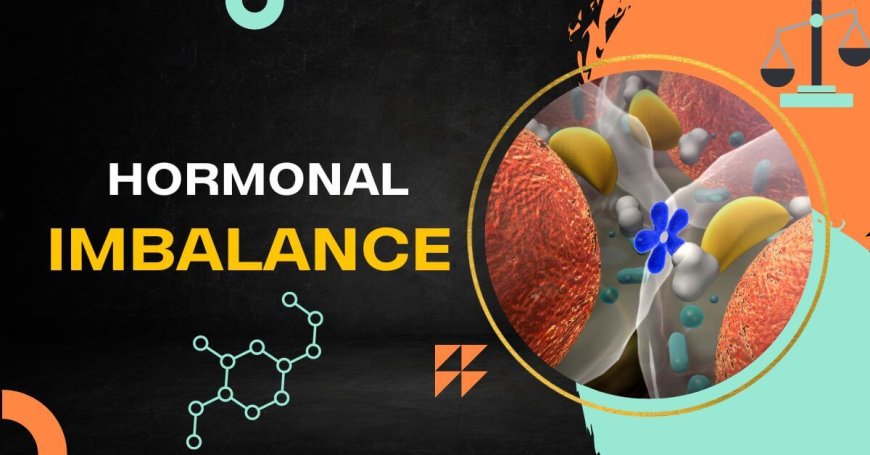Hormonal Imbalance in Women: Causes, Symptoms, and Natural Remedies
Learn about the causes, symptoms, and natural remedies for hormonal imbalance in women. Discover expert-backed solutions to restore hormone health.

Hormones play a crucial role in regulating nearly every function in the body, from metabolism and sleep to mood and reproductive health. However, when hormone levels become imbalanced, it can lead to a wide range of health issues that often go undiagnosed or misattributed to stress and lifestyle factors.
Many women experience hormonal imbalances at some point in their lives due to factors such as age, diet, stress, and medical conditions. While conventional treatments like hormone replacement therapy (HRT) exist, natural remedies and lifestyle changes can also be highly effective in restoring balance.
In this article, we’ll explore:
✅ The common causes of hormonal imbalance
✅ The key symptoms to watch for
✅ Natural remedies and lifestyle changes that help regulate hormones
What Causes Hormonal Imbalance in Women?
Hormonal imbalance occurs when the body produces too much or too little of a hormone, disrupting normal functions. Several factors can contribute to this condition:
1. Chronic Stress
-
The hormone cortisol, released during stress, can interfere with the balance of estrogen, progesterone, and thyroid hormones.
-
High cortisol levels may lead to irregular periods, weight gain, and mood swings.
? How Stress Affects Hormones (National Institutes of Health)
2. Poor Diet and Nutritional Deficiencies
-
Processed foods, sugar, and unhealthy fats can lead to insulin resistance, a condition that disrupts estrogen and progesterone levels.
-
Deficiencies in vitamins B6, D, and magnesium can impair hormone production and metabolism.
3. Thyroid Dysfunction
-
Hypothyroidism (underactive thyroid) can cause fatigue, depression, and weight gain.
-
Hyperthyroidism (overactive thyroid) leads to anxiety, rapid heart rate, and unintended weight loss.
? Understanding Thyroid Disorders (American Thyroid Association)
4. Polycystic Ovary Syndrome (PCOS)
-
PCOS is a condition where high androgen (male hormone) levels lead to irregular periods, acne, and excessive hair growth.
-
It is often linked to insulin resistance and weight gain.
5. Perimenopause and Menopause
-
Estrogen and progesterone levels fluctuate and decline as women approach menopause, causing hot flashes, night sweats, and mood swings.
6. Birth Control and Medications
-
Hormonal contraceptives, such as birth control pills, can disrupt the natural hormonal balance when taken long-term.
-
Certain medications, like steroids and antidepressants, can also interfere with hormone production.
? How Birth Control Affects Hormones (Office on Women’s Health)
Common Symptoms of Hormonal Imbalance
The symptoms of hormonal imbalance vary depending on which hormones are affected. Here are some key signs to look out for:
1. Irregular Periods
-
Skipping periods, unusually heavy or light flow, and unpredictable cycles often indicate an estrogen or progesterone imbalance.
2. Unexplained Weight Gain or Loss
-
Low thyroid function can cause weight gain, while excessive stress hormones or overactive thyroid can lead to rapid weight loss.
3. Chronic Fatigue
-
Feeling constantly tired, even after a full night’s sleep, could signal adrenal or thyroid dysfunction.
4. Acne and Skin Problems
-
High androgen levels contribute to cystic acne, especially along the jawline and chin.
-
Estrogen deficiency can cause dry, aging skin.
5. Mood Swings, Anxiety, and Depression
-
Fluctuations in estrogen and progesterone impact serotonin levels, leading to mood instability and irritability.
6. Sleep Disturbances
-
Low progesterone levels can make it harder to fall asleep, while high cortisol levels may cause nighttime awakenings.
7. Hair Loss or Thinning
-
Androgen imbalances can lead to hair thinning on the scalp while causing excess facial hair growth.
8. Digestive Issues
-
Estrogen plays a role in gut health, and imbalances can lead to bloating, constipation, or irritable bowel syndrome (IBS).
Natural Remedies for Hormonal Balance
If you suspect a hormonal imbalance, natural remedies can help restore harmony without relying solely on medication.
1. Balance Your Diet
-
Increase healthy fats like avocados, nuts, and omega-3-rich fish to support hormone production.
-
Reduce processed foods and refined sugar to prevent insulin spikes.
-
Eat fiber-rich foods like leafy greens and flaxseeds to help detox excess estrogen.
? Best Foods for Hormonal Balance (Healthline)
2. Manage Stress Effectively
-
Practice deep breathing, meditation, or yoga to lower cortisol levels.
-
Take adaptogenic herbs like ashwagandha and rhodiola, which help the body adapt to stress.
3. Get Quality Sleep
-
Aim for 7-9 hours of uninterrupted sleep each night.
-
Avoid blue light from screens at least one hour before bedtime to prevent melatonin disruption.
? Sleep and Hormone Health (Sleep Foundation)
4. Exercise in Moderation
-
Strength training and moderate cardio help regulate insulin and reduce stress hormones.
-
Avoid excessive high-intensity workouts, as they can elevate cortisol levels.
5. Herbal Remedies
-
Maca root helps balance estrogen and progesterone levels.
-
Chasteberry (Vitex) is commonly used for PMS and menstrual irregularities.
? Herbs for Hormone Balance (National Institutes of Health)
6. Support Your Gut Health
-
A healthy gut microbiome supports hormone metabolism.
-
Take probiotics and eat fermented foods like yogurt, kimchi, and sauerkraut.
7. Limit Toxins and Endocrine Disruptors
-
Avoid plastic containers, BPA, and synthetic fragrances, which contain chemicals that mimic hormones.
-
Switch to organic skincare and household products.
Final Thoughts
Hormonal imbalances are common but treatable, and many women experience relief by making simple lifestyle changes. Whether it’s adjusting your diet, managing stress, or incorporating herbal supplements, natural approaches can restore balance and improve overall well-being.
However, if symptoms persist, it’s important to consult a healthcare provider for proper evaluation and treatment options.
For more expert-backed information on hormone health, check out this comprehensive guide on balancing hormones naturally from the Office on Women’s Health.
What's Your Reaction?
 Like
0
Like
0
 Dislike
0
Dislike
0
 Love
0
Love
0
 Funny
0
Funny
0
 Angry
0
Angry
0
 Sad
0
Sad
0
 Wow
0
Wow
0



















































